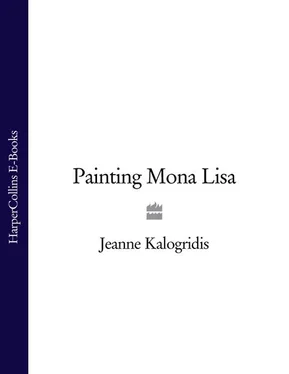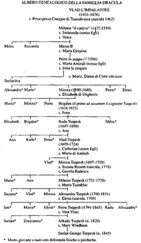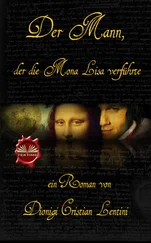‘I prayed for his soul, then, even though everyone was afraid of saying a kind word about the Pazzi. The giovani played with his body for a few more days; then they grew tired of it, and threw it in the Arno. It was seen floating to the sea as far away as Pisa.’ She paused, then looked directly at me. ‘You must understand: Lorenzo has done many good things for the city. But he kept the people’s hatred of the Pazzi alive. I have no doubt at least one of the giovani pocketed a florin or two, dropped into his palm by Lorenzo himself. His vengeance knew no bounds, and for that, God will someday make him pay.’
The next day, by way of apology, my father took me with him in his carriage to deliver his very best wools to the Medici palazzo. We rode inside the great iron gates. As always, I remained in the carriage while servants tethered the horses and my father went in the side entry, accompanied by Medici servants laden down with his wares.
He was inside longer than usual – almost three-quarters of an hour. I grew restless, having memorized the building’s façade, and exhausted my imagination as to what lay behind it.
At last the guards at the side entry parted and my father emerged. But instead of returning to our coach, he stepped to one side and waited. A cadre of guards sporting long swords followed him out the door. An instant later, a single man emerged, leaning heavily on the muscular arm of another; one of his feet was unslippered, wrapped to just above the ankle in the softest combed wool used for newborns’ blankets.
He was sallow and slightly stooped, blinking in the bright sun. He looked to my father, who directed his attention to our wagon.
I leaned forwards on the seat, mesmerized. The man – homely, with a huge crooked nose and badly misaligned lower jaw – squinted in my direction. After a word to his companion, he drew closer, wincing with each step, scarcely able to bear any weight on the stricken foot. Yet he persisted until he stood no more than the length of two men from me. Even then, he had to crane his neck to see me.
We stared unabashed at each other for a long moment. He appraised me intently, his eyes filled with cloaked emotion I could not interpret. The air between us seemed atremble, as though lightning had just struck: he knew me, though we had never met.
Then the man gave my father a nod, and retreated back inside his fortress. My father entered the carriage and sat beside me without a word, as if nothing unusual had taken place. As for me, I uttered not a word; I was stricken speechless.
I had just had my first encounter with Lorenzo de’ Medici.
XV XV XVI XVII XVIII XIX XX XXI XXII XXIII XXIV XXV XXVI XXVII XXVIII XXIX XXX XXXI XXXII XXXIII XXXIV XXXV XXXVI XXXVII XXXVIII XXXIX XL XLI XLII XLIII XLIV XLV XLVI XLVII XLVIII XLIX L LI LII LIII LIV LV LVI LVII LVIII LIX LX LXI LXII LXIII LXIV LXV LXVI LXVII LXVIII LXIX LXX Epilogue: Lisa July 1498 LXXI Acknowledgements By the same author Copyright About the Publisher
The new year brought ice-covered streets and bitter cold. Despite the weather, my father abandoned our parish of Santo Spirito and began crossing the Arno to attend Mass daily at the cathedral of San Marco, known as the church of the Medici. Old Cosimo had lavished money on its reconstruction and maintained a private cell there, which he had visited more frequently as he neared death.
The new prior, one Fra Girolamo Savonarola, had taken to preaching there. Fra Girolamo, as the people called him, had come to Florence from Ferrara less than two years earlier. An intimate of Lorenzo Medici, Count Giovanni Pico, had been much impressed by Savonarola’s teachings, and so had begged Lorenzo, as the unofficial head of San Marco, to send for the friar. Lorenzo complied.
But once Fra Girolamo gained control of the Dominican monastery, he turned on his host. No matter that Medici money had rescued San Marco from oblivion; Fra Girolamo railed against Lorenzo – not by name, but by implication. The parades organized by the Medici were pronounced sinful; the pagan antiquities assiduously collected by Lorenzo – blasphemous; the wealth and political control enjoyed by him and his family – an affront to God, the only rightful wielder of temporal power. For those reasons, Fra Girolamo broke with the custom followed by all of San Marco’s new priors: He refused to pay his respects to the convent’s benefactor, Lorenzo.
Such behaviour appealed to the enemies of the Medici and to the envious poor. But my father was entranced by Savonarola’s prophesies of the soon-to-come Apocalypse.
Like many in Florence, my father was a sincere man who strove to understand and appease God. Being educated, he was also aware of an important astrological event that had occurred several years earlier – the conjunction of Jupiter and Saturn. All agreed this marked a monumental event. Some said it augured the arrival of the Antichrist (widely believed to be the Turkish sultan Mehmet, who had stolen Constantinople and now threatened all Christendom), others that it predicted a spiritual cleansing within the Church.
Savonarola believed it foretold both. My father returned one morning breathless after Mass; Fra Girolamo had admitted during the sermon that God had spoken directly to him. ‘He said that the Church would first be scourged, then purified and revived,’ my father said, his face aglow with a peculiar light. ‘We are living at the end of time.’
He was determined to take me with him the following Sunday to hear the friar speak. And he begged my mother to accompany us. ‘He is touched by God, Lucrezia. I swear to you, if only you would listen with your own ears, your life would be forever changed. He is a holy man, and if we convinced him to pray for you …’
Normally my mother would never have refused her husband, but in this case, she held firm. It was too cold for her to venture out, and crowds tended to excite her overmuch. If she went to Mass, it would be at our own church of Santo Spirito, only a short walk away – where God would hear her prayers just as surely as he heard Fra Girolamo’s. ‘Besides,’ she pointed out, ‘you can always listen to him, then come and tell me directly what he has said.’
My father was disappointed and, I think, irritated, though he kept it from my mother. And he remained convinced that, if my mother would only go and listen to Fra Girolamo, her condition would improve magically.
The day after my parents’ disagreement on this subject, a visitor came to our palazzo: Count Giovanni Pico of Mirandolo, the very man who had convinced Lorenzo de’ Medici to bring Savonarola to Florence.
Count Pico was an intelligent, sensitive man, a scholar of the classics and the Hebrew Cabala. He was handsome as well, with golden hair and clear grey eyes. My parents received him cordially – he was, after all, part of the Medici’s inner circle … and knew Savonarola. I was allowed to sit in on the adults’ conversation while Zalumma hovered, directing other servants and making sure Count Pico’s goblet was full of our best wine. We gathered in the great chamber where my mother had met with the astrologer; Pico sat beside my father, directly across from my mother and me. Outside, the sky was obscured by lead-coloured clouds that threatened rain; the air was cold and bone-achingly damp – a typical Florentine winter’s day. But the fire in the hearth filled the room with heat and an orange light that painted my mother’s face with a becoming glow, and glinted off the shining gold of Pico’s hair.
What struck me most about Ser Giovanni, as he wished to be called, was his warmth and utter lack of pretension. He spoke to my parents – and most strikingly, to me – as if we were his equals, as if he was beholden to us for our kindness in welcoming him.
Читать дальше












